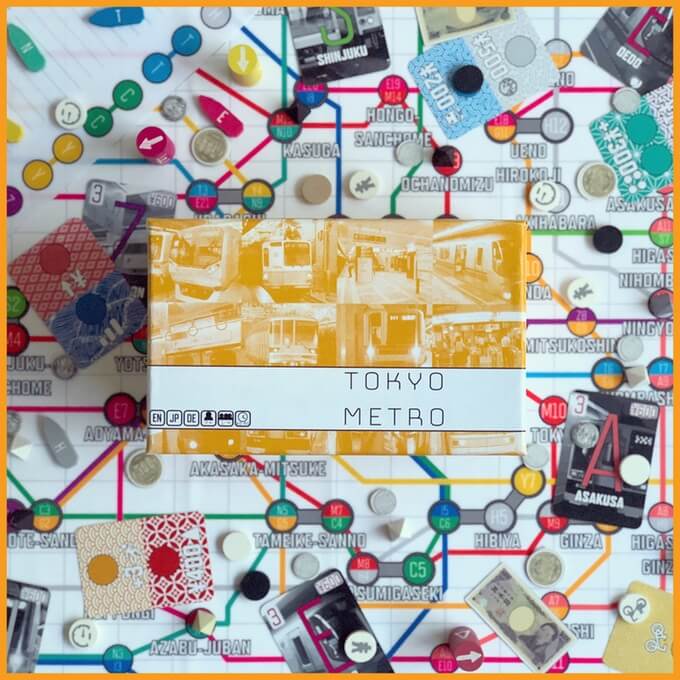Tokyo Series Now Kickstarting: Vending Machines, Metro Management and Abstract Architecture
As a kid, I remember spending hours retooling games and rules from leftover pieces of playsets and boardgames, making up rules on the fly to match the hodgepodge of resources I had to work with. Jordan Draper’s Tokyo Series is, at worst, a beautiful refinement of that endeavour, and at best exactly what it pitches — a series of ‘real world simulations of the beautiful and overlooked life in Tokyo, Japan‘.
The Tokyo Series — which will ultimately number twelve instalments, with dozens of extra games to be found among the combinations — is the latest creation from the mind of Jordan Draper of Dark Flight Games, creator of Import/Export, Turing Market and more. It’s set to, much like industrialised Japan itself, embody the fantastical moments of awe which most only fleetingly feel when technology meets the mundane — those fits and starts where we find a new device and ponder at its function, or when a new system replaces a long-standing one: a robot a waiter, a vending machine a pop-up-shop. Yet it also encapsulates the structural logic that persists behind that; where stock must be in place, or elements must fit just right, in order for said technology to work. The games are, simply, based on the concept of mechanics. In this they are a celebration of the overlooked elements of mundane life.
Tokyo Jidohanbaiki, Metro and Jutaku are the first three instalments in the dozen-strong series. Already (at time of writing) achieving over 400% of its target, the future of the series looks bright.
Dark Flight Games’ Jordan Draper explaining the three titles in a video recorded ahead of a debut at Essen Spiel ’17.

Those of you familiar with the previous work of Dark Flight will already recognise Jutaku, a game of stacking awkwardly shaped geometric pieces to build peculiarly arranged houses, from its 2016 Kickstarter. However, even Jutaku, as Tokyo Jutaku, has received some refinement; larger components and improved materials increase the quality to match the efforts of the new series.
The other two titles included in the Tokyo Series Kickstarter, Tokyo Jidohanbaiki and Tokyo Metro, are both of extremely impressive scale.
Metro is a worker placement title which contains a large train network as a playing area as well as miniatures and cards, which form a (core) game about investing in and buying up stations and train lines along an extensive network. It’s in players’ best interests to work around similar areas due to the compound interest nature of the game, and even as a standalone game it looks like one where the size of the board ensures that the game won’t grow dull if repeatedly played with the same group.

Of the two new titles, however, Jidohanbaiki, is definitely the darling of the duo. Unlike Metro, which can already be printed and played entirely from the website, Jidohanbaiki is reliant on a fantastical assortment of miniatures. Fantastical because they’re based off the mundane: the contents of the box are all inspired by vending machines.
Jidohanbaiki’s little coin chits, advertising boards, drinks containers, crates and vending-machine–shaped dice tower are wonderful.
Perhaps more interesting is that there are over twenty planned rulesets for the pieces, with thirteen of them already fully digestible in the rulebook. Each is named for a drink as well, which just brings it all together as groups inevitably discuss their favourite and which they’d like to try next.

Not only is Jidohankaiki the most varied of the three titles, but it’s also a compilation of design efforts from a variety of board game developers outside of Dark Flight. While we don’t know if this will be a continuing trend, some of the remaining nine titles have been conceptualised, with another ‘heavy’ title already close to playtesting.
You can read more about the idea behind the modular design, as well as some intent for the future of the twelve-game Tokyo Series set in our interview with designer Jordan Draper.
The Kickstarter, “TOKYO SERIES: JIDOHANBAIKI, METRO, & JUTAKU” will conclude on the fourth of February. Pledges of $99 (+ $10–15 shipping) will get all three physical games midway through this year, but individual games start from $35.
Comments are closed.